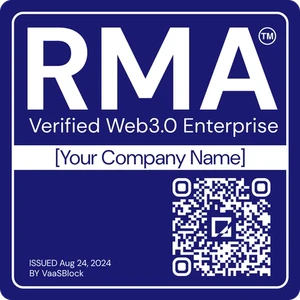
Lagrange Foundation
Risk Management
?Risk Management
The RMA™ is a blockchain credibility certification assessing governance, transparency, security, and results, providing trusted verification for businesses in Web3.
VaaSBlock has not audited this project and cannot vouch for this organization.
RMA™ Status: ❌ Unverified
Verification of 6 major compliance criteria.
Technology
?Technology
A collection of public facing information, data collected through partners and our own tools view we present a projects technology in one place for easy verification.
Analysis and testing of tech infrastructures.
Marketing
Alpha?Marketing
Top level look at a projects marketing capablities currently in alpha this section will grow to show quickly how a project promotes itself and the effectiveness.
Screening of user base and community feedback.
Background
?Background
Using multiple public facing sources across the web view a summary of a projects purpose, key achievements and general overview.
Collection of basic administrative documentation.
Risk Management
Last Updated
2025/4/16
Transparency
Transparency Score
Algorithmic assessment of a project’s transparency level, using multiple public data points to measure its commitment to compliance, documentation, and clarity in communication.
Transparency Score
Category Rank
A ranking that positions the organization among its industry peers, evaluating its relative performance based on key compliance, credibility, and transparency indicators.
Category Rank
Lagrange Foundation vs Layer-1
VaaSBlock Rank
A global ranking that compares the organization against all entities listed on VaaSBlock, reflecting its overall credibility, transparency, and operational performance versus the full Web3 ecosystem.
VaaSBlock Rank
Lagrange Foundation vs All Listed Organizations
Transparency
Transparency Score
Transparency Score
Algorithmic assessment of a project’s transparency level, using multiple public data points to measure its commitment to compliance, documentation, and clarity in communication.
Category Rank
Lagrange Foundation vs Layer-1
Category Rank
A ranking that positions the organization among its industry peers, evaluating its relative performance based on key compliance, credibility, and transparency indicators.
VaaSBlock Rank
Lagrange Foundation vs All Listed Organizations
VaaSBlock Rank
A global ranking that compares the organization against all entities listed on VaaSBlock, reflecting its overall credibility, transparency, and operational performance versus the full Web3 ecosystem.
RMA™
✘ UnverifiedCorporate Governance
The verification of fundamental governance, organizational structure, including verifying the entity’s legal registration and adherence to local laws and regulations.
Corporate
Governance

Team Proficency
Evaluation of an organization’s personnel, ensuring that crucial team members possess the expertise and dedication necessary to execute current business models and scale effectively.
Team
Proficiency

Technology & Security
Assessment of the organization’s technological framework, including blockchain integrations (where relevant), system architecture, and overall IT infrastructure.
Technology
& Security

Revenue Model
Comprehensively evaluation of a company’s income-generating strategies (how do they make or intend to make money), ensuring financial robustness and sustainability.
Revenue
Model

Results Delivered
The Results Delivered component of the RMA™ audit comprehensively evaluates an organization’s ability to achieve its goals and honor its commitments.
Results
Delivered

Planning & Transparency
The Planning and Transparency component of the RMA™ audit offers a thorough assessment of how an organization manages its workflow and prepares for unexpected challenges.
Planning &
Transparency

Technology
Marketing
Marketing Effectiveness
This score assesses the impact of detected marketing activity and the corresponding price movement of a token. The score understands whole market movements to ensure tokens are assessed fairly against peers.
Marketing Effectiveness
Confidence Index
This index determines our confidence in the score we have given. Generally, as more data is collected, the confidence index will increase. If a project has lots of activity, this confidence is earned faster.
Confidence Index
VaaSBlock Rank
This identifies where a project sits compared to all projects accessed for Marketing Effectiveness.
VaaSBlock Rank
Lagrange Foundation vs All Listed Organizations
Marketing Effectiveness
Marketing Effectiveness
This score assesses the impact of detected marketing activity and the corresponding price movement of a token. The score understands whole market movements to ensure tokens are assessed fairly against peers.
Confidence Index
Confidence Index
This index determines our confidence in the score we have given. Generally, as more data is collected, the confidence index will increase. If a project has lots of activity, this confidence is earned faster.
VaaSBlock Rank
Lagrange Foundation vs All Listed Organizations
VaaSBlock Rank
This identifies where a project sits compared to all projects accessed for Marketing Effectiveness.
No Chain No Gain™ Podcast ⛉
This Organization is yet to join the No Chain No Gain™ Podcast and share insights on what makes their business trustable and innovative.
💡 NCNG generated over 1 Million impressions in its first six months of existence.
PR Impact
PR Impact
VaaSBlock provides estimations to the impact that traditional digital media can have on a project. This is an early release; more areas of PR are planned in future versions.
Search Terms ? Search TermsThese are the terms we discovered the article for on page one of Google. | Est. Traffic ? Estimated TrafficWe estimate how much traffic an article will get. Generally, our estimations are slightly higher than those of more established tools. We are working on the algorithm all the time, and results could change. | Est. Value ? Estimated ValueBased on the estimated traffic we generate an estimation for what this traffic would have cost to generate if you tried to target these users with ads. The positions for the article on google and the location of the traffic are the major factors in this estimation. | |||
|---|---|---|---|---|---|
Lagrange Labs Airdrop New La Token Launch Foundation source: Theblock | Lagrange Labs Airdro… Seen 2024-06-25T19:00:00.000Z Lagrange Labs Airdrop New La Token Launch Foundation source: Theblock | Organic | theblock.co | ||
Lagrange Foundation Airdrop – Airdrop Alert source: airdropalert.com | Lagrange Foundation … Seen 2025年6月6日 Lagrange Foundation Airdrop – Airdrop Alert source: airdropalert.com | Organic | airdropalert.com | ||
Lagrange Foundation may buy back $LA tokens to stabilize price | MEXC News source: mexc.com | Lagrange Foundation … — Lagrange Foundation may buy back $LA tokens to stabilize price | MEXC News source: mexc.com | Organic | mexc.com | ||
Lagrange Labs (LA) Funding Rounds, Token Sale Review & Tokenomics Analysis | CryptoRank.io source: cryptorank.io | Lagrange Labs (LA) F… — Lagrange Labs (LA) Funding Rounds, Token Sale Review & Tokenomics Analysis | CryptoRank.io source: cryptorank.io | Organic | cryptorank.io |
| Est. Traffic | Est. Value | ||
|---|---|---|---|
Lagrange Labs Airdro… Seen 2024-06-25T19:00:00.000Z | |||
Lagrange Foundation … Seen 2025年6月6日 | |||
Lagrange Foundation … — | |||
Lagrange Labs (LA) F… — |
Background
Organization Name – Lagrange Foundation
Category – Layer-1
About
powered by irmaAI
irmaAILagrange is a decentralized infrastructure protocol focused on enabling scalable, verifiable computation using zero-knowledge (ZK) technology. It is designed to serve the growing demand for trustless,… high-throughput computation across Web3 applications, particularly in the fields of blockchain scalability, artificial intelligence (AI), and data validation. Through its ecosystem of products, Lagrange introduces new cryptographic primitives that power provable data indexing and general-purpose computation, laying the groundwork for verifiable execution environments in decentralized networks.
At the heart of Lagrange’s architecture is the Lagrange Prover Network (LPN), a decentralized marketplace where multiple provers generate cryptographic proofs for computational tasks submitted by clients. The network is built on EigenLayer and leverages Ethereum restaking to create a high-assurance environment that does not depend on centralized infrastructure. Provers in the LPN are rewarded with the protocol’s native token, $LA, which also powers its staking, fee, and governance mechanisms. This model aligns incentives between proof generators and clients while ensuring trustless computation at scale.
The protocol’s second major component is the ZK Coprocessor. It acts as a computational oracle for blockchain networks, enabling off-chain data and AI computations to be proven and verified on-chain. This extends the functionality of smart contracts by allowing them to interact with complex data sets or external algorithms while still maintaining integrity and decentralization. This includes uses like AI model inference, on-chain search over indexed data, and modular rollup execution proofs.
Lagrange’s technology is designed to work across multiple domains and chains. Its architecture is modular and customizable, allowing developers to integrate ZK-verifiable computation into applications ranging from rollups to general dApps and DeFi protocols. The ZK Coprocessor is EVM-compatible, designed to interface with multiple chains and execution environments, effectively creating a universal verification layer across ecosystems.
The Lagrange token ($LA) plays several roles within the network. It is used to pay for computation and proof generation, to stake by network participants (especially provers), and to govern protocol decisions. The supply of $LA is capped at 1 billion, with a gradual emission of 4% annually. Distribution is designed to ensure long-term ecosystem development, with allocations to contributors, investors, community growth, and airdrops. In addition, clients who require proofs can subsidize their operations through the network’s emission mechanism, making large-scale computations more affordable.
The protocol’s launch involved an airdrop that used proof-of-humanity and proof-of-uniqueness schemes to ensure fair distribution. Participants had to complete a social experiment called Turing Roulette, designed to separate human participants from AI agents. This novel approach not only ensured Sybil resistance but also aligned with the project’s broader interest in AI-human interactions in cryptographic systems.
Lagrange has seen rapid adoption since launch. The ZK Coprocessor has already processed over 3 million AI inferences and 11 million ZK proofs. More than 85 operator nodes are participating in the Prover Network. Institutional partners include leading names like Coinbase Cloud, OKX, Nethermind, and Kraken. These partnerships underscore the protocol’s credibility and relevance in the infrastructure landscape.
The project’s public-facing development arm, Lagrange Labs, is supported by the independent Lagrange Foundation, a non-profit entity that oversees community coordination, governance, funding, and research. This ensures a separation of commercial development and decentralized governance, which aligns with the project’s decentralization ethos.
Lagrange is poised to be a foundational layer for the next generation of on-chain infrastructure. With growing interest in AI, data availability, and scalability, verifiable computation is expected to become a core primitive. Lagrange is addressing this head-on by making it simple, secure, and cost-effective for developers to outsource computational tasks and verify results on-chain.
In conclusion, Lagrange is not just a zero-knowledge protocol, but a broader vision for how computation, verification, and decentralization can converge. Its combination of the LPN, ZK Coprocessor, and $LA token economy is a compelling model for the future of verifiable infrastructure in blockchain and beyond. With strong momentum, institutional backing, and a clear technical roadmap, Lagrange is well-positioned to become a critical backbone in the decentralized computing ecosystem. Read More
Creation Date
February 2026
Headquarters
Unknown
Organization Maturity Level
Early-Stage
RMA™ Type
–
Useful Links
Website – lagrangefoundation.org
Notable Achievements
2025
LPN network launched
2025
$LA token airdrop
- vaasblock.com /
- Layer-1 /
- Lagrange Foundation








